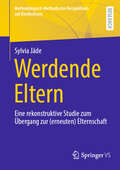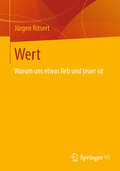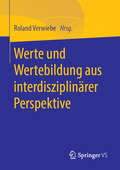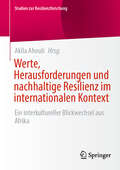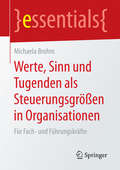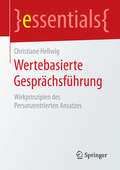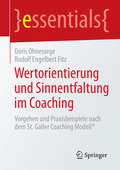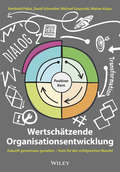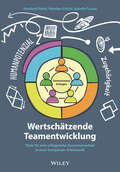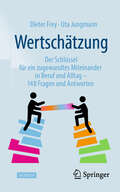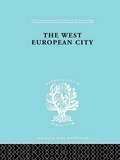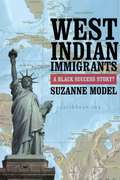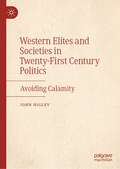- Table View
- List View
Werbe- und Konsumentenpsychologie
by Georg FelserWie funktioniert Werbung? Wie werden Kaufentscheidungen beeinflusst? Wie manipulierbar sind wir als Konsumentinnen und Konsumenten? Welche Methoden im Marketing funktionieren und warum? Das Buch „Werbe- und Konsumentenpsychologie“ gibt Antworten auf diese Fragen. Mit der fünften Auflage des seit Jahren erfolgreichen und prüfungsrelevanten Lehrbuchklassikers halten Sie die psychologischen Grundlagen des Neuromarketings und der Verhaltensökonomie in Ihren Händen. Wussten Sie, dass ein nicht geringer Teil unseres Konsumverhaltens durch automatische, unbewusste und »implizite« Prozesse gesteuert wird? In diesem leicht verständlichen und gleichzeitig wissenschaftlich anspruchsvollen Buch erfahren Sie, welche Rolle diesen Prozessen tatsächlich zukommt. Diese Neuauflage wurde um eine Vielzahl aktueller Forschungsergebnisse sowie neuer Textabschnitte und Kapitel wie z.B. zum digitalen Marketing, Werbung über Influencer, die Bedeutung von Kundenrezensionen, die Folgen des E-Commerce, Online- und Versandhandel und „innovative“ Werbeformen wie z.B. Ambient Marketing oder Native Advertising erweitert.
Werden, wer ich bin: Psychologisches Wissen zur Persönlichkeitsentwicklung
by Cornelia WrzusStimmt es, dass Hans nicht mehr erlernt, was Hänschen nicht gelernt hat? Und wer formt unsere Persönlichkeit stärker – Eltern, Freunde, der Lebenspartner oder doch die Gene? Das Buch präsentiert den aktuellen Stand der internationalen psychologischen Forschung zum Thema Persönlichkeitsentwicklung. Es richtet sich an Menschen mit Interesse an fundiertem Wissen darüber, wie sich Persönlichkeitseigenschaften entwickeln, wobei kein Vorwissen in Psychologie erforderlich ist. Leserinnen und Leser erfahren, wie sich Eigenschaften von Menschen im Durchschnitt im Laufe ihres Lebens verändern, welchen Einfluss Gene und Umwelterfahrungen haben, welche Rolle Lebensereignisse spielen und inwieweit sich Eigenschaften durch Coaching, Therapie und ähnliche Anstrengungen beeinflussen lassen. Realistische und anschauliche Beispiele helfen, hilfreiche Aspekte in den eigenen Alltag zu transportieren. Unterhaltsame Grafiken sowie Podcasts vermitteln Fakten und Befunde in knapper, aufgelockerter Form (Edutainment). Geschrieben für … alle, die sich für Persönlichkeitsentwicklung interessieren – Führungskräfte, Psychotherapeuten, Coaches können mitlesen. Die Autorin: Cornelia Wrzus ist Professorin für Psychologische Alternsforschung an der Ruprecht-Karls-Universität Heidelberg. Sie interessiert sich für Persönlichkeitsentwicklung im Erwachsenenalter und Alter, Persönlichkeit und soziale Beziehungen im Lebensverlauf, Neurotizismus und Stressreaktionen in Alltagssituationen … und dafür, das verständlich zu vermitteln.
Werdende Eltern: Eine rekonstruktive Studie zum Übergang zur (erneuten) Elternschaft (Methodologisch-Methodische Perspektiven auf Kindheit(en))
by Sylvia JädeDie qualitative Längsschnittstudie widmet sich der Phase der Eltern- und Familienwerdung aus einer erziehungswissenschaftlichen Perspektive und fragt danach, wie werdende Eltern den Übergang zur (erneuten) Elternschaft aktiv herstellen. Der Übergang wird dabei als komplexer sozialer Prozess verstanden, der unterschiedliche Lebensbereiche berührt. Anhand von Elterninterviews wurden zwei sinngenetische Typen des Übergangs zur Elternschaft rekonstruiert: der affektiv-selbstläufige und der gestaltend-planvolle Typ. Die Typen umfassen handlungsleitende Orientierungen der Befragten zu den Bereichen Kind(er), Elternschaft, Erziehung, Familie, Alltag und Paarbeziehung. Zudem wurde ein Vergleich realisiert, der empirische Einblicke in Unterschiede und Gemeinsamkeiten des Übergangs in die Erst- und Mehrfachelternschaft bietet. Insgesamt wird herausgearbeitet, dass die Fokussierung des Projektcharakters von Elternschaft und der Krisenhaftigkeit von Erstelternschaft häufig zu kurz greift, weil dieser Übergang in Beziehungen und das alltägliche Familienleben eingelassen ist.
Wert: Warum uns etwas lieb und teuer ist
by Jürgen Ritsert"Wert" ist ein Grundbegriff, der im Alltag sowie in einer ganzen Reihe von Fachwissenschaften meist mit aller Selbstverständlichkeit benutzt wird: in der Moralphilosophie, der Ökonomie, der Politologie, der Soziologie, der Ethnologie und der Kulturanthropologie. Doch er ist und bleibt - wie schon Max Weber festgestellt hat - ein "Schmerzenskind" der Kulturwissenschaften. Dieser Essay informiert über einige Kontroversen über den Wertbegriff sowie einige begehbare Pfade in der Sumpflandschaft des Wertdiskurses. Der Text steht in einem inneren Zusammenhang mit den beiden Essays des Verfassers über den Problembegriff und vier Grundbegriffe der politischen Philosophie (2012).
Werte und Wertebildung aus interdisziplinärer Perspektive
by Roland VerwiebeWerte sind nicht nur in der Öffentlichkeit ein vieldiskutiertes Thema. Diverse wissenschaftliche Fachdisziplinen setzen sich aus unterschiedlicher Perspektive mit Werten sowie mit dem Konzept der Wertebildung auseinander. Vor diesem Hintergrund vereint der Sammelband theoretische und methodische Ansätze aus Philosophie, Erziehungswissenschaft, Politologie, Theologie, Kommunikationswissenschaft, Literaturwissenschaft und Soziologie. Ziel ist die Darstellung inter- und transdisziplinärer Verbindungslinien und Differenzen innerhalb der Forschung zu Werten und Wertebildung. Die Beiträge in diesem Band bieten einen aktuellen Überblick über verschiedene Theorietraditionen, diskutieren aber auch relevante empirische Befunde zu Werten und Wertebildung. Allen Ansätzen gemeinsam ist die Frage danach, was unter Werten verstanden werden kann und wie und unter welchen Umständen sie sich herausbilden.
Werte und Wertewandel in der postmigrantischen Gesellschaft
by Astrid Wonneberger Katja Weidtmann Sabina Stelzig Diana LölsdorfDieser Sammelband beschäftigt sich mit Werte-, Normen- und Einstellungswandel in unserer durch zunehmende kulturelle Differenz geprägten Gesellschaft. Eingebettet in die aktuelle Diskussion um eine „postmigrantische Gesellschaft“ stellen die Beiträge Erkenntnisse vor, die im Rahmen verschiedener Forschungsprojekte der BMBF-Förderlinie „Migration und gesellschaftlicher Wandel“ entstanden sind. Behandelt werden Unterschiede und Gemeinsamkeiten in Bezug auf Werte- und Normenvorstellungen von Menschen mit und ohne Migrationshintergrund, Zusammenhänge zwischen Wertvorstellungen und Integrationsmechanismen, die Notwendigkeit von Werte-, Normen- und Verhaltenswandel in verschiedenen Bereichen unserer Gesellschaft u.v.m. Die Beiträge thematisieren vor allem Werte und Normen im Zusammenhang mit Familie, Geschlechterbeziehungen, Gleichberechtigung, Erziehung, Religion und Sprache. Diese stehen auch im Fokus aktueller Diskurse in unserer von Migration geprägten Gesellschaft.
Werte, Herausforderungen und nachhaltige Resilienz im internationalen Kontext: Ein interkultureller Blickwechsel aus Afrika (Studien zur Resilienzforschung)
by Akila AhouliAls Gegenbegriff zur Verletzbarkeit und Vulnerabilität profiliert sich das Resilienz-Ideal in der Forschung über und aus Afrika oft in Form der Problemlösefähigkeit und adaptiven Bewältigungskompetenz traditioneller Volkskulturen in Prozessen der Modernisierung, der Globalisierung und vor allem gegenüber den damit verbundenen sozio-ökonomischen Fehlentwicklungen, Konflikten und Krisen. Aus dem Blickwinkel der nunmehr über 50 Jahre bestehenden interkulturellen Germanistik in Afrika südlich der Sahara versuchen die im vorliegenden Band gesammelten Beiträge, sich von der im Krisen-Fetischismus quasi gefangen gehaltenen Forschungstradition zu entfernen, um sich mit Werten und Wertebildern auseinanderzusetzen, die Gesellschaften und Wissenschaften für ein positives Resilienzverständnis nachhaltig vorbereiten können. Dabei wird im Band folgenden zentralen Fragen nachgegangen: Welche positiven Werte können für vergangene, gegenwartsbezogene und zukünftige Krisensituationen fruchtbar gemacht werden? Nach welchen strategischen Mitteln werden diese Werte ausgearbeitet und übertragen? Welche Rolle spielt dabei eine afrikanische Germanistik, die sich als interkulturell versteht?
Werte, Sinn und Tugenden als Steuerungsgrößen in Organisationen: Für Fach- und Führungskräfte (essentials)
by Michaela BrohmMichaela Brohm stellt Konzepte und Strategien effektiver, wohlbefindlicher und lukrativer Organisationen vor. Sie erläutert, warum sich integre Führungskräfte mutig, gerecht und menschlich verhalten, und gibt Impulse für die werte- und sinnorientierte Individual- und Organisationsentwicklung. Wertvolle Anregungen, inspirierende Beispiele und ein umfassendes Inventar zu den Strategien werteorientierter Steuerung regen zum Transfer in die Praxis an.
Wertebasierte Gesprächsführung: Wirkprinzipien der Personzentrierten Theorie (essentials)
by Christiane HellwigPraxisnah erläutert die Autorin die grundlegenden Begriffe der Personzentrierten Theorie von Carl Rogers und ihre Bedeutung für eine wertebasierte Gesprächsführung. Auf dieser Basis wird die Relevanz der damit verbundenen humanistischen Haltung vermittelt und dargestellt, wie Menschen darin unterstützt werden können, ihrer Motivation auf die Spur zu kommen. Mit Beispielen aus dem Coaching und dem Führungsalltag wird eingängig beschrieben, wie die personzentrierten Wirkprinzipien dazu beitragen, im wörtlichen Sinn selbst-bewusster zu handeln; sie sind Erfolgsfaktoren und das Fundament wertschätzender Kommunikation. Und sie wirken kontextübergreifend: Sie sind Grundlage für Gespräche in psychosozialen genauso wie in wirtschaftlichen Arbeitsfeldern.
Wertebasierte Gesprächsführung: Wirkprinzipien des Personzentrierten Ansatzes (essentials)
by Christiane HellwigPraxisnah erläutert die Autorin die grundlegenden Begriffe des Personzentrierten Ansatzes und seine Bedeutung für eine wertebasierte Gesprächsführung. Mit der damit verbundenen Haltung werden Menschen darin unterstützt, ihrer Motivation auf die Spur zu kommen und im wörtlichen Sinn selbst-bewusst zu handeln. Die nach dem Personzentrierten Ansatz von Carl Rogers beschriebenen Wirkprinzipien tragen maßgeblich dazu bei und werden hier mit Beispielen aus dem Coaching und dem Führungsalltag eingängig dargestellt. Sie sind Erfolgsfaktoren und das Fundament wertschätzender Kommunikation. Und sie wirken kontextübergreifend: Sie sind Grundlage für Gespräche in psychosozialen genauso wie in wirtschaftlichen Arbeitsfeldern.
Wertorientierung und Sinnentfaltung im Coaching: Vorgehen und Praxisbeispiele nach dem St. Galler Coaching Modell® (essentials)
by Doris Ohnesorge Rudolf Engelbert FitzDoris Ohnesorge und Rudolf E. Fitz positionieren zunächst die These, dass Menschen sich Ziele nicht der Ziele wegen setzen, sondern weil sie Werte vermehren oder Wertverletzungen vermeiden wollen. Aufbauend darauf beschreiben die Autoren, warum und wie Werte im Zusammenhang mit Entwicklungsvorgängen der wesentliche Antrieb für Menschen sind. Diese Wirkung zeigt sich besonders im Kontext Führung, Beratung und Coaching. Werte beinhalten nämlich eine zentrale und starke Dynamik, den Sinn. Erst eine Sinnentfaltung lässt Menschen nicht nur zufrieden, sondern sinnerfüllt leben und arbeiten. Aus dieser Grundüberlegung heraus entstand das St. Galler Coaching Modell®, das auf Werteentwicklung ausgerichtet ist. Ziel der jahrelangen Evaluierung dieses Modells war es, alle entwicklungsrelevanten Elemente in Veränderungsvorgängen zu identifizieren und in ein systemisches und systematisches Modell zu übertragen.
Wertorientierungen und Wahlverhalten: Effekte gesellschaftlicher Wertorientierungen bei den Bundestagswahlen 2009 - 2017 (Wahlen und politische Einstellungen)
by L. Constantin WurthmannIn diesem Open-Access-Buch untersucht L. Constantin Wurthmann die sehr enge Beziehung zwischen Wertorientierungen und Wahlverhalten. Obwohl Wertorientierungen und gesellschaftliche Wertorientierungen im Speziellen zu den zentralsten Konzepten empirischer Sozialforschung gehören, wurde ihre Wirkungsweise im Wahlverhalten bisweilen stiefmütterlich behandelt. Die vorliegende Studie entwickelt einen Vorschlag zur konzeptionellen Erfassung gesellschaftlicher Wertorientierungen und deren Einfluss auf das Wahlverhalten der bundesdeutschen Bevölkerung, welcher anschließend mit Daten der German Longitudinal Election Study (GLES) für die Bundestagswahlen 2009, 2013 und 2017 überprüft wird. Dabei lassen sich strukturelle Veränderungen gesellschaftlicher Wertorientierungen in den Wählerschaften deutscher Parteien nachweisen.
Wertorientierungen und organisationale Werte in Laufbahnen: Eine rekonstruktive Studie in einem Finanzdienstleistungsunternehmen
by Katharina AgostiniKatharina Agostini untersucht in dieser qualitativ-rekonstruktiven Studie die Bedeutsamkeit von Wertorientierungen und organisationalen Werten für das Alltagshandeln von Akteuren und Akteurinnen eines öffentlich-rechtlichen Finanzdienstleistungsunternehmens. Die Autorin setzt verschiedene theoretische Sichtweisen in Bezug zueinander und eröffnet Perspektiven auf handlungspraktische, organisationale sowie geschlechts-, hierarchie- und laufbahnbezogene Aspekte. Die Ergebnisse aus qualitativen Interviews mit Mitarbeitenden und Führungskräften liefern einen wichtigen Beitrag für den Diskurs um die Bedeutung individueller Wertorientierungen sowie organisationaler Werte im Kontext beruflichen Handelns und Erlebens.
Wertschätzende Organisationsentwicklung: Zukunft gemeinsam gestalten - Tools für den erfolgreichen Wandel
by David Schneider Reinhold Pabst Michael Soszynski Marian KujauIn ihrem Buch beschreiben die Autoren die Grundlagen von Organisationsentwicklungsprozessen und Gestaltungsmöglichkeiten. Methodisch basiert das Buch auf dem "Appreciative Inquiry" Ansatz für wertschätzende Organisationsentwicklung. Die angebotenen Werkzeuge zielen auf Lösungsfokussierung und Ressourcenaktivierung bei gleichzeitiger Wertschätzung dessen, was gut funktioniert. Im Buch beschreiben die Autoren zunächst die Grundlagen der Organisationsentwicklung, indem sie wichtige Begriffe kurz erläutern und visualisieren. Außerdem finden sich einige Storytelling-Elemente zur Vermittlung der Inhalte und einen ausgeprägten Serviceteil mit Stimmen aus der Praxis. Weitergehend bringen die vier Autoren, ihre eigene angewandte Erfahrung aus verschiedenen Organisationsentwicklungsprojekten mit ein. Die Organisationsentwicklungsmethode "Appreciative Inquiry (AI)" bzw. Wertschätzende Erkundung ist ein positiver Ansatz für Transformationsprozesse. Er verändert die Blickweise von der Herausforderung oder Problemsituation auf die Lösungsfokussierung und Ressourcenaktivierung. Der 5D-Zyklus von "Appreciative Inquiry" (Define, Discover, Dream, Design, Deliver) gibt die Struktur für die Werkzeuge, die in diesem Buch vorgestellt werden, vor. Für jede der fünf Prozessphasen stellen die vier Autoren ihre erprobten Lieblingstools vor. Sie bieten dem Anwender einen schnellen und unmittelbaren Einstieg in die praktische Umsetzung. Im abschließenden Kapitel bieten die Autoren die Herangehensweisen und Lösungsansätze für verschiedene Anlässe von Organisationsentwicklungsprojekten.
Wertschätzende Teamentwicklung: Tools für eine erfolgreiche Zusammenarbeit in einer komplexen Arbeitswelt
by Reinhold Pabst Mareike Schutt Isabelle TyrasaIn "Wertschätzende Teamentwicklung" beschreiben die Autoren die Grundlagen von Teamentwicklungsprozessen. Die Betonung liegt auf Humanpotenzialen: Das sind Werte, die ein Zusammengehörigkeitsgefühl fördern. Diese sollten vorgelebt und gefördert werden. Weiterhin gilt es, die Interaktion in der Zusammenarbeit zu fördern, den Beziehungsaufbau aktiv zu gestalten und Anreize für eine selbst- und fremdmotivierte Beteiligung zu schaffen. "Wertschätzende Teamentwicklung" stärkt den Zusammenhalt im Team, das Wissensmanagement sowie die Lernkultur. Konzepte und Tools für die Anwendung werden mit inspirierenden Stimmen aus der Praxis ergänzt, um ein möglichst ganzheitliches und praxisnahes Bild auf die Thematik zu werfen. Methodisch werden Anreize gesetzt, lineare Denkpfade zu verlassen und eigene Routinen zu reflektieren. Ziel ist die Gestaltung einer wünschenswerten Zukunft! Dazu müssen relevante Probleme adressiert und selbst eine Haltung entwickelt werden, die die Sinnhaftigkeit von Lösungen hinterfragt. Das Buch basiert auf dem "Appreciative Inquiry"-Ansatz für wertschätzende Organisationsentwicklung sowie auf der konstruktivistischen Annahme, dass jedes menschliche Handeln von Wirklichkeitskonstruktionen gesteuert sei. Das heißt, die Perspektiven bzw. die Blickwinkel, die ein Mensch einnimmt, bestimmen, was er wahrnimmt. Durch die Änderung der Perspektive kann gleichzeitig auch die Problemsituation verändert werden. Die im Buch angebotenen Werkzeuge zielen auf eine Lösungsfokussierung und Ressourcenaktivierung bei gleichzeitiger Wertschätzung von dem, was bereits gut funktioniert.
Wertschätzung: Der Schlüssel für ein zugewandtes Miteinander in Beruf und Alltag – 148 Fragen und Antworten
by Dieter Frey Uta JungmannMit Wertschätzung handeln und behandelt werden – das wollen viele. Doch wie kann uns das in Zeiten von Krisen und Konflikten gelingen? Dieter Frey, anerkannter Sozial- und Organisationspsychologe, gibt darauf im Gespräch mit der Journalistin Uta Jungmann zahlreiche Antworten und macht deutlich: Gerade, wenn es schwierig wird, zeigt sich, wie wirkungsvoll Wertschätzung ist – als Kitt, der das Team im Unternehmen zusammenhält und stärkt. Als Bindeglied zwischen Menschen im Alltag, an der Universität, in der Schule oder der Familie. Für ein zugewandtes Miteinander am Arbeitsplatz und in einer von Spaltung bedrohten Gesellschaft. Anhand vieler Beispiele schildert der Psychologe, anschaulich und auf anregende Weise, wie sich mit Wertschätzung ganz konkret Brücken zu anderen Menschen bauen lassen, und mit ihr jeder einen Schlüssel für schwierige Situationen in der Hand hält. – Ein Buch für alle, die sich angesichts zunehmender Polarisierung tiefer mit Wertschätzung befassen möchten und überlegen, wie sie im Beruf gefördert werden kann – damit das Leben und Arbeiten in einer Welt des Umbruchs für alle entspannter wird.
Wertschöpfung hybrid gestalten: Geschäftsmodellentwicklung und Arbeitsgestaltung in der Digitalisierung (ifaa-Edition)
by ifaa – Institut für angewandte Arbeitswissenschaft e. V.In diesem Open-Access-Buch ist die Digitalisierung von Geschäftsmodellen anhand von Praxisbeispielen beschrieben. Dies umfasst einerseits die Entwicklung digitaler bzw. hybrider Geschäftsmodelle und andererseits die Gestaltung des Umsetzungsprozesses im Unternehmen. Dazu zählen Veränderungen an Strukturen der Aufbau- und Ablauforganisation ebenso wie an Zusammenarbeit, Führung und Kompetenzbedarf. Alle Vorgehensweisen und Lösungen sind anschaulich dargestellt. Damit verbundene Potenziale werden ebenso aufgezeigt wie kritische Erfolgsfaktoren.
Weshalb auf die Wissenschaft hören?: Antworten aus Philosophie und wissenschaftlicher Praxis
by Dennis Lehmkuhl Andreas BartelsPandemie und Klimakrise rufen die herausragende Rolle der Wissenschaft und des wissenschaftlichen Wissens für Informierung und Orientierung der Gesellschaft sowie für die Beratung der Politik bei der Ausrichtung praktischer Maßnahmen ins Bewusstsein. In diesem Zusammenhang wird die Frage virulent, weshalb der Wissenschaft diese herausgehobene Rolle zukommt. Dass diese Frage trotz der vielbeschworenen Autorität der Wissenschaft alles andere als trivial ist, zeigt sich daran, dass Wissenschaftsskepsis und Relativierung wissenschaftlicher Resultate bis hin zur Wissenschaftsleugnung Einfluss gewinnen, sobald es um konkrete Fragen der Ausrichtung gesellschaftlichen Handelns an der Wissenschaft geht. Wodurch ist also Vertrauen in die durch die Wissenschaft ermittelten Fakten, die in ihren Modellen entworfenen Szenarien und ihre Ratschläge an Gesellschaft und Politik gerechtfertigt? Weshalb soll man der Wissenschaft in besonderem Maße vertrauen und auf ihren Ratschlag hören?Insgesamt sollen die Beiträge des Buches Aufschluss darüber geben, wodurch die Vertrauenswürdigkeit der Wissenschaft in ihrer modernen Form gerechtfertigt ist und an welche Bedingungen ihre besondere Rolle in der Gesellschaft geknüpft ist. Was kann Wissenschaft für die Gesellschaft leisten und wo liegen die Grenzen ihrer orientierenden Rolle? Was heißt es „auf die Wissenschaft zu hören“ und was sind die Bedingungen dafür, dass Menschen in einer demokratischen Gesellschaft sich wissenschaftliche Erkenntnisse aneignen und sie als Richtschnur für ihr Handeln verwenden?
West African Migrations
by Olufemi Vaughan Moj�b�ol� Ol�f�nk� OkomeDrawing on the interdisciplinary research projects of scholars from various social science and humanities disciplines, this book explores how African migration to Western countries after the neo-liberal economic reforms of the 1980s transformed West African states and their new transnational populations in Western countries.
West European City Ils 179 (International Library of Sociology)
by Robert E DickinsonFirst Published in 1998. Routledge is an imprint of Taylor & Francis, an informa company.
West Germany and the Global Sixties
by Timothy Scott BrownThe anti-authoritarian revolt of the 1960s and 1970s was a watershed in the history of the Federal Republic of Germany. The rebellion of the so-called '68ers' - against cultural conformity and the ideological imperatives of the Cold War; against the American war in Vietnam; in favor of a more open accounting for the crimes of the Nazi era - helped to inspire a dialogue on democratization with profound effects on German society. Timothy Brown examines the unique synthesis of globalizing influences on West Germany to reveal how the presence of Third World students, imported pop culture from America and England and the influence of new political doctrines worldwide all helped to precipitate the revolt. The book explains how the events in West Germany grew out of a new interplay of radical politics and popular culture, even as they drew on principles of direct-democracy, self-organization and self-determination, all still highly relevant in the present day.
West Indian Immigrants: A Black Success Story?
by Suzanne ModelWest Indian immigrants to the United States fare better than native-born African Americans on a wide array of economic measures, including labor force participation, earnings, and occupational prestige. Some researchers argue that the root of this difference lies in differing cultural attitudes toward work, while others maintain that white Americans favor West Indian blacks over African Americans, giving them an edge in the workforce. Still others hold that West Indians who emigrate to this country are more ambitious and talented than those they left behind. In West Indian Immigrants, sociologist Suzanne Model subjects these theories to close historical and empirical scrutiny to unravel the mystery of West Indian success. West Indian Immigrants draws on four decades of national census data, surveys of Caribbean emigrants around the world, and historical records dating back to the emergence of the slave trade. Model debunks the notion that growing up in an all-black society is an advantage by showing that immigrants from racially homogeneous and racially heterogeneous areas have identical economic outcomes. Weighing the evidence for white American favoritism, Model compares West Indian immigrants in New York, Toronto, London, and Amsterdam, and finds that, despite variation in the labor markets and ethnic composition of these cities, Caribbean immigrants in these four cities attain similar levels of economic success. Model also looks at "movers" and "stayers" from Barbados, Jamaica, Trinidad, and Guyana, and finds that emigrants leaving all four countries have more education and hold higher status jobs than those who remain. In this sense, West Indians immigrants are not so different from successful native-born African Americans who have moved within the U.S. to further their careers. Both West Indian immigrants and native-born African-American movers are the "best and the brightest"—they are more literate and hold better jobs than those who stay put. While political debates about the nature of black disadvantage in America have long fixated on West Indians' relatively favorable economic position, this crucial finding reveals a fundamental flaw in the argument that West Indian success is proof of native-born blacks' behavioral shortcomings. Proponents of this viewpoint have overlooked the critical role of immigrant self-selection. West Indian Immigrants is a sweeping historical narrative and definitive empirical analysis that promises to change the way we think about what it means to be a black American. Ultimately, Model shows that West Indians aren't a black success story at all—rather, they are an immigrant success story.
West Indian Immigrants: A Black Success Story?
by Suzanne ModelWest Indian immigrants to the United States fare better than native-born African Americans on a wide array of economic measures, including labor force participation, earnings, and occupational prestige. Some researchers argue that the root of this difference lies in differing cultural attitudes toward work, while others maintain that white Americans favor West Indian blacks over African Americans, giving them an edge in the workforce. Still others hold that West Indians who emigrate to this country are more ambitious and talented than those they left behind. In West Indian Immigrants, sociologist Suzanne Model subjects these theories to close historical and empirical scrutiny to unravel the mystery of West Indian success. West Indian Immigrants draws on four decades of national census data, surveys of Caribbean emigrants around the world, and historical records dating back to the emergence of the slave trade. Model debunks the notion that growing up in an all-black society is an advantage by showing that immigrants from racially homogeneous and racially heterogeneous areas have identical economic outcomes. Weighing the evidence for white American favoritism, Model compares West Indian immigrants in New York, Toronto, London, and Amsterdam, and finds that, despite variation in the labor markets and ethnic composition of these cities, Caribbean immigrants in these four cities attain similar levels of economic success. Model also looks at "movers" and "stayers" from Barbados, Jamaica, Trinidad, and Guyana, and finds that emigrants leaving all four countries have more education and hold higher status jobs than those who remain. In this sense, West Indians immigrants are not so different from successful native-born African Americans who have moved within the U.S. to further their careers. Both West Indian immigrants and native-born African-American movers are the "best and the brightest"—they are more literate and hold better jobs than those who stay put. While political debates about the nature of black disadvantage in America have long fixated on West Indians' relatively favorable economic position, this crucial finding reveals a fundamental flaw in the argument that West Indian success is proof of native-born blacks' behavioral shortcomings. Proponents of this viewpoint have overlooked the critical role of immigrant self-selection. West Indian Immigrants is a sweeping historical narrative and definitive empirical analysis that promises to change the way we think about what it means to be a black American. Ultimately, Model shows that West Indians aren't a black success story at all—rather, they are an immigrant success story.
West-Bloc Dissident: A Cold War Memoir
by William BlumA highly personal and candid memoir by a former U.S. State Department employee who became a radical dissident in the 1960s and remains active in opposing U.S. imperialism
Western Elites and Societies in Twenty-First Century Politics: Avoiding Calamity
by John HigleyThis book focuses on threats to the continued viability of Western institutions and practices for which it is not easy to conceive remedies consistent with the Western tradition. Higley argues that structural difficulties in postindustrial societies, particularly the United States, the United Kingdom, France, and elsewhere, threatened troubles that political manipulation by elites might not be sufficient to contain or resolve. Struggling against lethal climate change, politically explosive waves of migrants and refugees, the likelihood of further pandemics, populist nationalism, and destabilizing effects of social media, elites must consider new demographic, economic, social, political, and international policies. Higley offers a powerful and provocative analysis of the elite’s ability to sustain Western societies in their current social and political forms.


